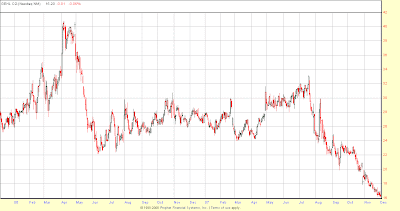The Agriculture Trade


Since it's still the holiday season, how about another food post on New Year's Eve day. I haven't really talked about agricultural commodities on here except for a brief comment in January of 2007. At that time the deafening roar in the media and on Wall Street was that corn was going to be the next gold or thereabouts. I wrote at the time that I had a bet with farmer who was also affected by the media frenzy that soybeans would outperform corn in 2007. It's now almost a year later. From the date of that post corn is up a measly 25 cents give or take. And soybeans are up over 50%. Not a bad trade. Of course, that wasn't exactly a difficult call. The fundamentals supported soybean outperformance regardless of the deafening roar of frenzied media and the Wall Street hype machine. But did and do fundamentals support either commodity at these price levels? We are told so by Wall Street. And, we are generally told investment markets are all seeing, all knowing and efficient. It must therefore be true. But, wait a minute. Didn't equity markets lose $13-odd trillion in value post the 2000 bubble? Eh, what's a few trillion here and there? I have to digress a minute. This cult-ish intelligentsia view of the equity market is hilarious. In 2006 I heard a well known prognosticator hypothesizing that the stock market might be telling us another terrorist attack was going to happen. That had to be one of the most unintelligible comments I have heard to date. Now we've assigned some type of omniscience and clairvoyance to an auction medium? I prefer a Ouija board if I am going to conjure up the spirits.
I'm a farm boy so what is happening with agricultural commodities isn't exactly a foreign topic to me. And, I am also a consumer so it isn't exactly difficult to see food commodity prices are up substantially in many products including dairy and grains. As an aside, has anyone heard a single investment professional question the validity of this 20 year commodity bull market thrust upon us by Wall Street? Fundamentals required to support a twenty year commodity bull market are in extreme jeopardy. I'm more inclined to believe as I have written that we might see a lengthy period of vicious and very large swings in commodities. Of course, even that outcome isn't a foregone conclusion. In any event, I expect very large commodity price swings will decimate most investors. I wouldn't want to be one of the investors that has sunk hundreds of billions into base commodity futures and trillions into commodity related stocks unless I had done so as substantially lower price levels. Much like the other toxic trash Wall Street peddled to pension funds, investors and government agencies, I expect commodities too will blow up. I've seen many of Wall Street's quantitative studies used to pedal commodity investments based on historical performance versus equities. They are very flawed. But the color charts are pretty. After this initial cyclical swell caused by herding behavior, there is substantial risk on a go forward basis. Personally, I'd be happy to have ridden this trade to stratospheric heights and excuse myself from the party.
Above are charts of two companies in the agriculture business. One is Gehl and the other is Deere. I believe Gehl is the largest non-tractor agricultural equipment manufacturer in the U.S. with a very strong global growth footprint and similarly Deere the largest tractor manufacturer in the U.S. Also with a strong global footprint. Both of these companies are exposed to other markets including infrastructure, the new Wall Street focus.
Gehl was a very strong performer this cycle being up over 700% until mid 2006 when it cratered. Yet, since a low in the fall of 2006 Deere is up 300%. So, how is this divergence accounted for? How could two companies in the same markets be responding so differently to the same fundamentals? If agriculture was a sustainable booming market that we are led to believe, what has happened to Gehl? Is this a poorly managed company? Is it a company specific problem? Is their non agriculture business negating booming gains in agriculture? Or is it because Gehl is a company not generally followed by the herd on Wall Street, therefore more likely trading on fundamentals predicting the real outcome of the agricultural trade? Is there a mania in Deere driven by ample liquidity in its stock that has attracted quantitative hedge fund traders who use mindless metrics to drive investments to the stratosphere? Are those same quantitative models used to drive the underlying commodities to the same stratospheric valuations with no regard for future economics or fundamentals? The same models used to drive all global assets to stratospheric levels with no regard for future economics?
So, what again is the premise of this agriculture trade that has driven commodities and related stocks to levels similar or even more substantial than the technology bubble? That emerging markets are now rich beyond our wildest dreams and they will now be consuming nectar and ambrosia ad infinitum? Or is it all Alan Greenspan's fault? Has he created a global bubble that has consumed every corner of the world by running the printing presses in his basement? Uhhm. I don't think so on either count.




